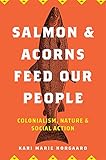Salmon and Acorns Feed Our People : Colonialism, Nature, and Social Action / Kari Marie Norgaard.
Material type: TextSeries: Nature, Society, and CulturePublisher: New Brunswick, NJ : Rutgers University Press, [2019]Copyright date: ©2019Description: 1 online resource (312 p.) : 14 b-w imagesContent type:
TextSeries: Nature, Society, and CulturePublisher: New Brunswick, NJ : Rutgers University Press, [2019]Copyright date: ©2019Description: 1 online resource (312 p.) : 14 b-w imagesContent type: - 9780813584201
- 9780813584225
- 304.209794 23
- online - DeGruyter
- Issued also in print.
| Item type | Current library | Call number | URL | Status | Notes | Barcode | |
|---|---|---|---|---|---|---|---|
 eBook
eBook
|
Biblioteca "Angelicum" Pont. Univ. S.Tommaso d'Aquino Nuvola online | online - DeGruyter (Browse shelf(Opens below)) | Online access | Not for loan (Accesso limitato) | Accesso per gli utenti autorizzati / Access for authorized users | (dgr)9780813584225 |
Browsing Biblioteca "Angelicum" Pont. Univ. S.Tommaso d'Aquino shelves, Shelving location: Nuvola online Close shelf browser (Hides shelf browser)

|

|

|

|

|

|

|
||
| online - DeGruyter You've Always Been There for Me : Understanding the Lives of Grandchildren Raised by Grandparents / | online - DeGruyter College in Prison : Reading in an Age of Mass Incarceration / | online - DeGruyter When Women Rule the Court : Gender, Race, and Japanese American Basketball / | online - DeGruyter Salmon and Acorns Feed Our People : Colonialism, Nature, and Social Action / | online - DeGruyter Sovereign Acts : Performing Race, Space, and Belonging in Panama and the Canal Zone / | online - DeGruyter After Capitalism : Horizons of Finance, Culture, and Citizenship / | online - DeGruyter At War : The Military and American Culture in the Twentieth Century and Beyond / |
Frontmatter -- CONTENTS -- INTRODUCTION -- 1. MUTUAL CONSTRUCTIONS OF RACE AND NATURE ON THE KLAMATH -- 2. ECOLOGICAL DYNAMICS OF SETTLER-COLONIALISM -- 3. RESEARCH AS RESISTANCE -- 4. ENVIRONMENTAL DECLINE AND CHANGING GENDER PRACTICES -- 5. EMOTIONS OF ENVIRONMENTAL DECLINE -- CONCLUSION. Climate Change as a Strategic Opportunity? -- METHODOLOGICAL APPENDIX -- ACKNOWLEDGMENTS -- NOTES -- WORKS CITED -- INDEX -- ABOUT THE AUTHOR
restricted access online access with authorization star
http://purl.org/coar/access_right/c_16ec
Since time before memory, large numbers of salmon have made their way up and down the Klamath River. Indigenous management enabled the ecological abundance that formed the basis of capitalist wealth across North America. These activities on the landscape continue today, although they are often the site of intense political struggle. Not only has the magnitude of Native American genocide been of remarkable little sociological focus, the fact that this genocide has been coupled with a reorganization of the natural world represents a substantial theoretical void. Whereas much attention has (rightfully) focused on the structuring of capitalism, racism and patriarchy, few sociologists have attended to the ongoing process of North American colonialism. Salmon and Acorns Feed Our People draws upon nearly two decades of examples and insight from Karuk experiences on the Klamath River to illustrate how the ecological dynamics of settler-colonialism are essential for theorizing gender, race and social power today.
Issued also in print.
Mode of access: Internet via World Wide Web.
In English.
Description based on online resource; title from PDF title page (publisher's Web site, viewed 21. Jun 2021)


